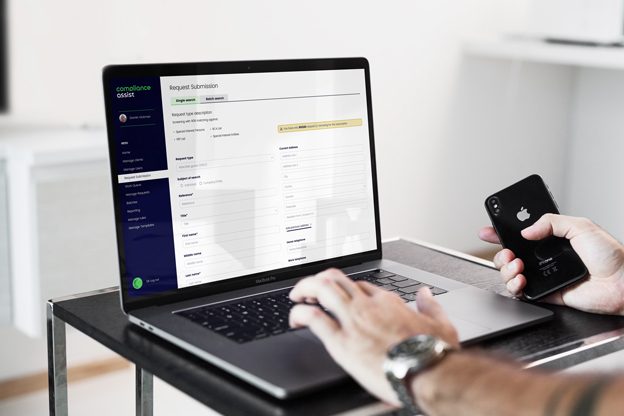
Reduce the impact of AML
- Anti-Money Laundering Checks for Accountants, Bookkeepers and Tax Specialists.
- Control your costs with our affordable, low-commitment solution.
- Speed up client onboarding with automated ID verification and watchlist screening.
- Reduce impact on your day to day operations with our user friendly AML solution.
- Outstanding customer service support here to assist and guide you.
Some of our clients
The likelihood of recommending ComplianceAssist rated 9.3/10
Customer Feedback Survey 2025
The AML Challenge
- AML compliance can disrupt an already-busy workday through tedious document collection and complicated records.
- Subscriptions can be lengthy and costly, tying you in for long periods with rising costs.
- Screening and ID Verification results can be unclear and confusing.
- Lack of clarity around checks meeting regulatory anti-money laundering requirements.
Our solution for Accountants
- A one-stop solution providing electronic and Physical ID verification for fast individual and business validation.
- Our subscription is designed around you. No monthly purchase commitment or multi year contract.
- Straightforward web-based platform with easy to use checks and uncomplicated results.
- A comprehensive solution fully compliant with UK anti-money laundering regulations.

Simplify your Due Diligence
Join the number of accountants and tax advisors already meeting their KYC and AML needs with ComplianceAssist. Our features are designed to make your AML operations as seamless as possible; global sanctions and PEP screening are included with all company and individual checks. Detailed audit trails and PDF reports keep you prepared for audit and inspections. Our data is direct from trusted data providers, such as Experian, giving you full confidence in your results.
Our expert support team are here to support and guide you through email and phone lines 8:30-5:30, Monday to Friday.

How can we help your business?
Get in touchFrequently Asked Questions
Under the money laundering regulations, accountancy service providers are:
- Auditors who carry out statutory audit work
- Accountants who provide accountancy services to clients
- Tax advisers and consultants who provide advice to clients about their tax affairs
- Payroll agents that provide accountancy services or tax advice
- Customs practitioners, freight forwarders and similar businesses if they provide accountancy or tax services
The main supervisory bodies are:
- Association of Accounting Technicians
- Association of Chartered Certified Accountants (ACCA)
- Association of International Accountants
- Association of Taxation Technicians
- Chartered Institute of Management Accountants
- Chartered Institute of Taxation
- Insolvency Practitioners Association
- Institute of Certified Bookkeepers
- Institute of Chartered Accountants in Ireland
- Institute of Chartered Accountants in Scotland
- Institute of Chartered Accountants of England and Wales
- Institute of Financial Accountants
- Institute of Accountants and Bookkeepers
- CDD involves verifying your client and analysing the risk they pose in terms of money laundering and terrorist financing.
- Accountants are required to perform CDD, by identifying clients, and beneficial owners, when entering a relationship with a business.
- Then the nature of the business relationship should be established, and the level of risk assessed to determine the level of due diligence needed.
- The client must then be verified independently, through electronic or Physical ID means, and it is recommended to be screened against Sanction and PEP watchlists.
- You should establish your AML operations as soon as your accountancy business is set up, including being registered and ready with a provider, and to produce a Risk Assessment and employee training.
- You need to perform due diligence before entering a business relationship with a client, which will include identifying and verifying your client.
- During the relationship, to remain HMRC compliant, you should monitor your clients for any change in circumstances or suspicious activity.
- If any trigger events should occur, you should take the appropriate steps to submit an SAR, or terminate the business relationship.
- You do not need to meet a client in person to verify them – there are multiple ways to remotely screen and verify clients and entities
- Electronic 2+2 verification can be used, using your client’s name, date of birth and address to
- Physical ID verification can remotely verify your client’s ID documents, proof of address documents and utilise face comparison to ensure your client is who they say they are.
- Company and financial checks can also be used to verify business details, with no need for documents to be collected.






